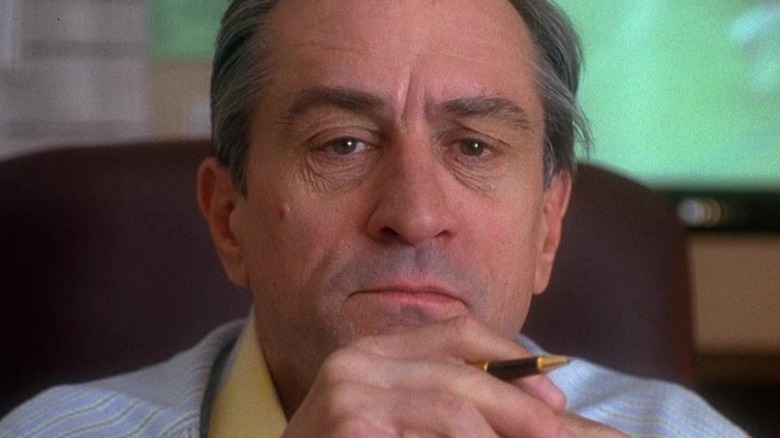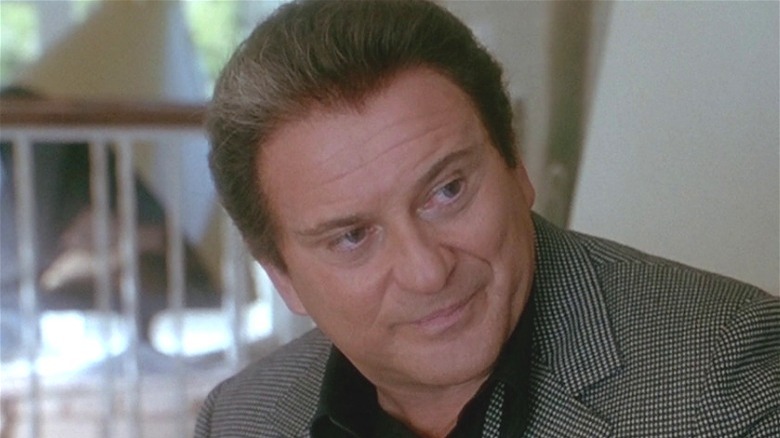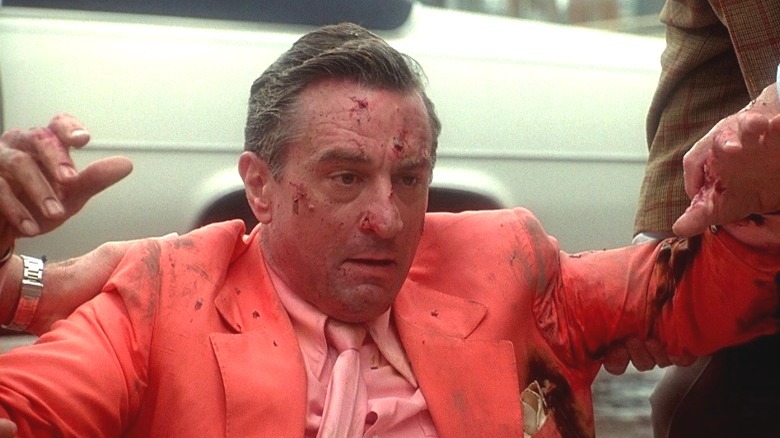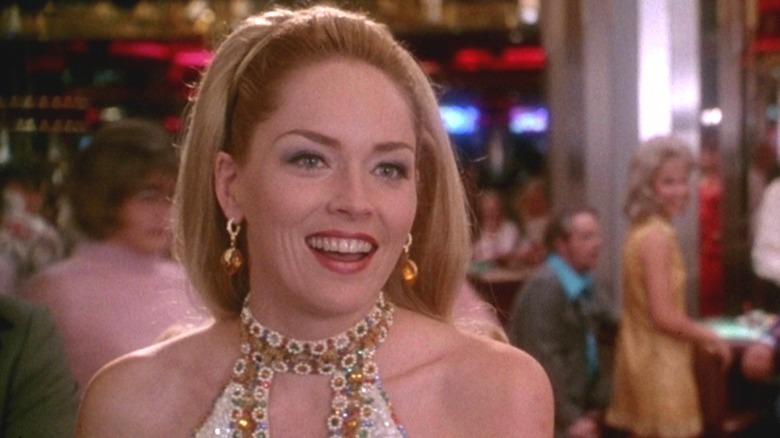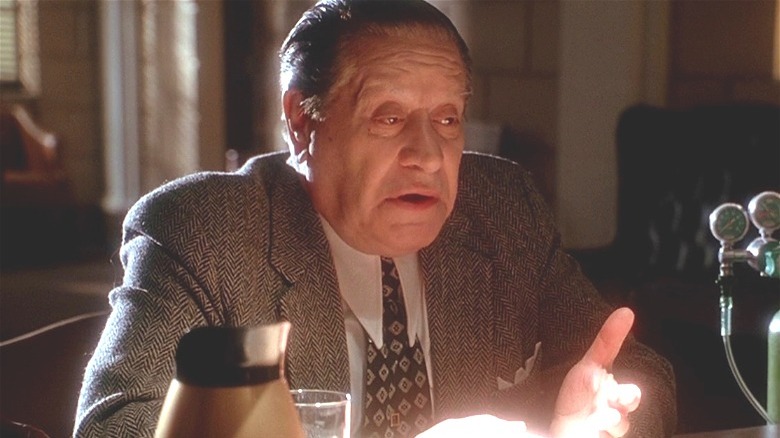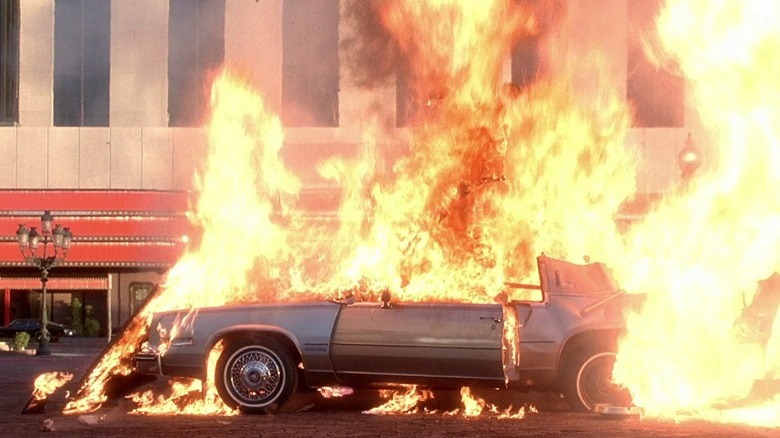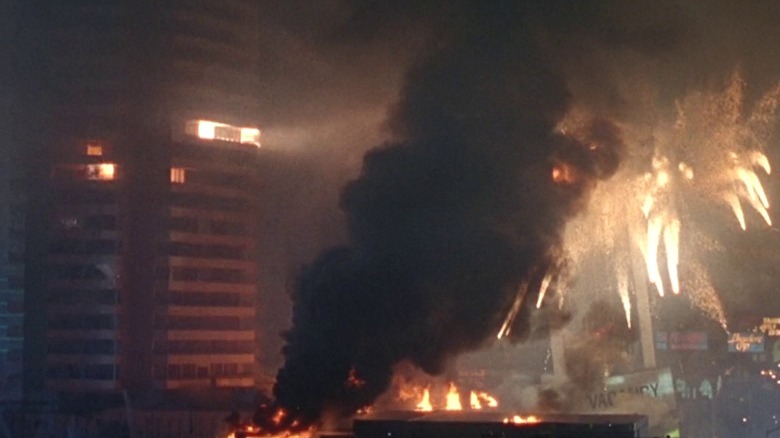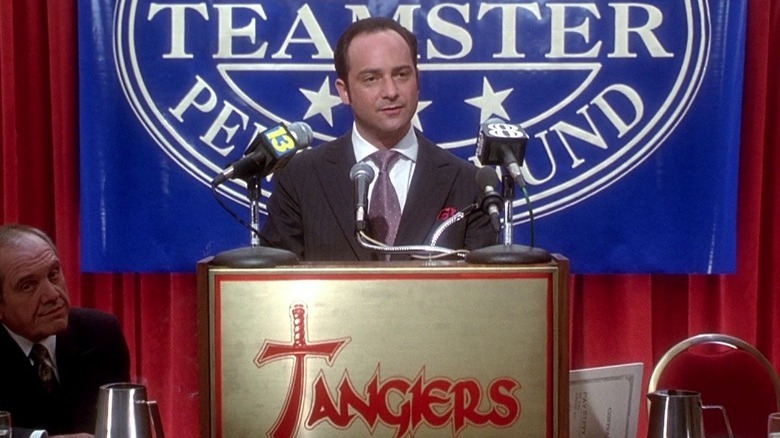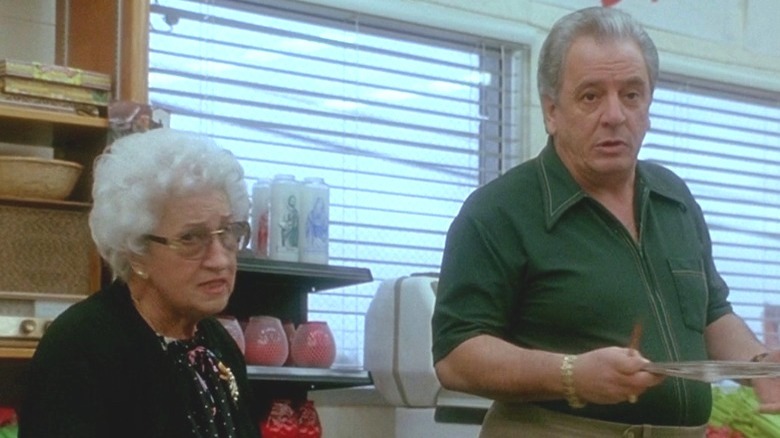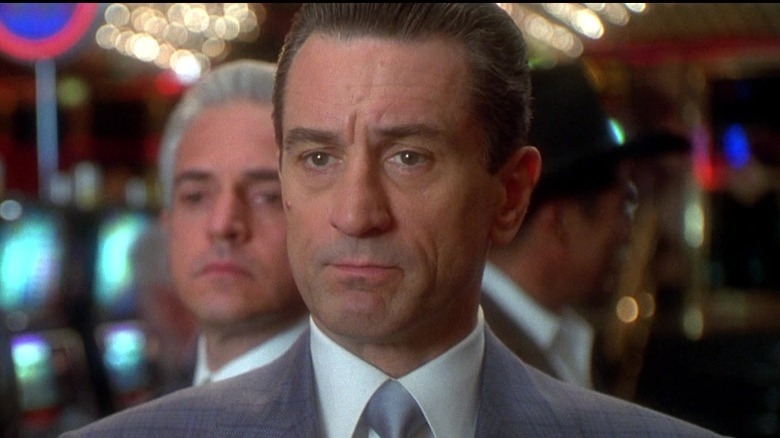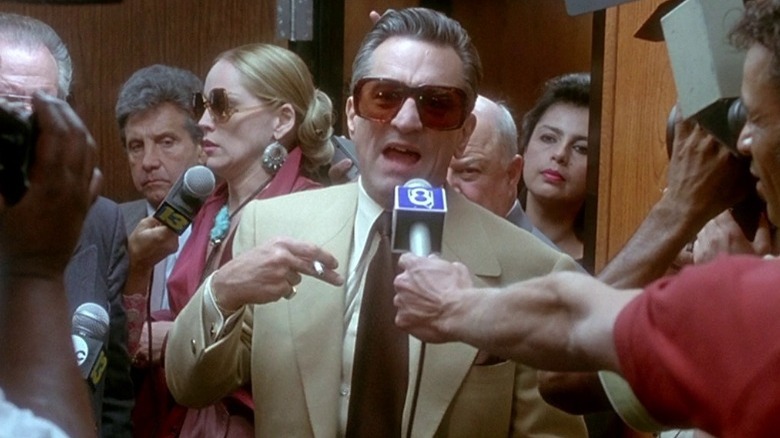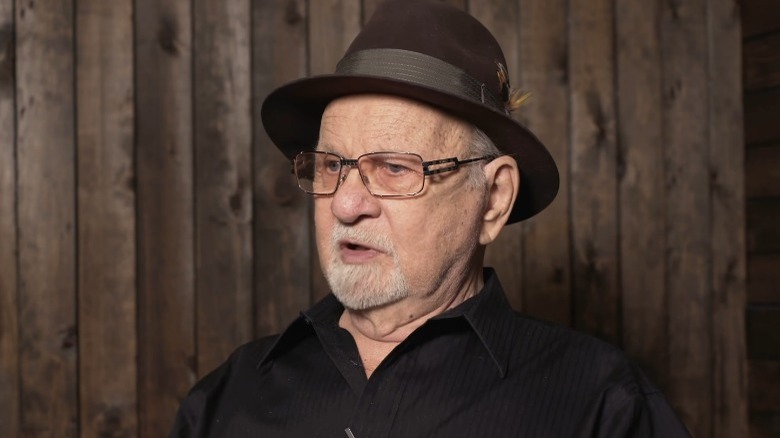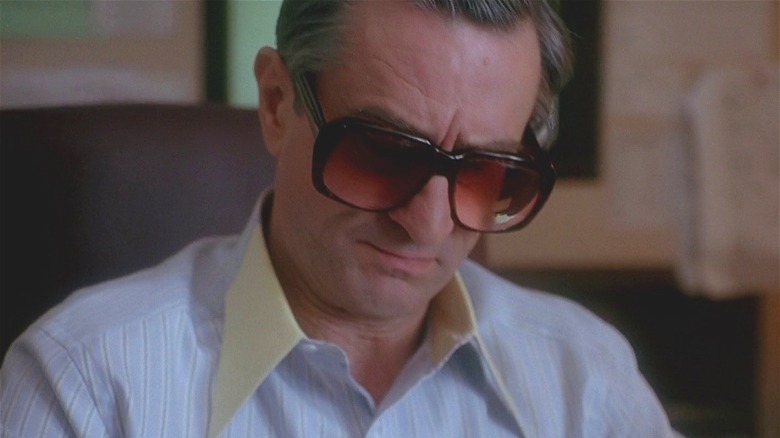The Ending Of Casino Finally Explained
Martin Scorsese's 1995 film "Casino" is one of the most epic gangster movies ever made. It was immediately nominated for several awards upon its release, and actress Sharon Stone won a Golden Globe for her performance. It also features legendary performances by Robert De Niro, Don Rickles, and Joe Pesci — in one of his last roles. James Woods also stars as a manipulative con man in one of his best performances.
"Casino" follows the somewhat true story of the mafia's control over various Las Vegas casinos in the 1970s and 1980s. In particular, it follows the story of Sam "Ace" Rothstein and his attempt to run the Tangiers casino on the strip. Using various methods of extortion, violence, theft, and even murder, the mob imposes its will on Las Vegas's politics and seedy underbelly.
However, each character's selfishness eventually gets the best of them, causing the entire house of cards to completely collapse in a massive bloodbath. In the end, the mob loses control over Las Vegas, irreparably changing the town forever. This is the ending of "Casino," finally explained.
Nicky Santoro's recklessness catches up with him
Joe Pesci played one of the most brutal and psychopathic characters in "Casino" as tough guy Nicky Santoro. Throughout the film, he has people physically assaulted and murdered, and in one of the most famous (and grotesque) scenes in the movie, he tortures a man to death with a bench vise. Yet, while continuing to try and exert his power throughout the city, he soon starts to run afoul of both his friend and partner, Sam "Ace" Rothstein as well as the mob bosses back home in Chicago.
At the end of the movie, the bosses have him and his brother murdered for being too out of control. The bosses do not just choose to have him killed, they do so most brutally and violently as possible to send a message. Nicky had been doing several things that ran afoul of the mob's code of ethics, including having an affair with Rothstein's wife Ginger, trying to murder Rothstein with a car bomb, and not giving the Midwest bosses all of the kickbacks from his robberies with the Hole in the Wall Gang.
In response, the Midwest bosses have Nicky and his brother Dominick brutally beaten with baseball bats in the middle of nowhere. They then have them buried alive as a warning to other potential mobsters to not run afoul of the bosses or get too reckless and bring FBI heat on the mafia.
Sam Ace Rothstein survives out of sheer luck
Throughout "Casino," Sam "Ace" Rothstein is portrayed as an incredibly smart and talented person. He is known to excel as an adept gambler and sports bettor, at which he is so smart and reliable that he can ingratiate himself at the highest levels of the Chicago mafia. The bosses send him to Las Vegas to run their operation there, and they also send Nicky Santoro as protection for him. But things break down between Nicky and Ace over Nicky's incredible use of violence and Ace's penchant for attention.
Nicky tries to have Ace murdered with a car bomb, and he would have succeeded if it had not been for a quirk in the way his Cadillac was designed. Unknown to both Ace and Nicky is that model of the car had a metal plate put underneath the driver's seat. When the car bomb went off, the plate stopped Ace's seat from instantly exploding, allowing him just enough time to escape out the door before the entire thing burst into flames.
Ironically, though Ace's intelligence is what sustains him through his career, it's sheer dumb luck that saves him from getting blown up. If Ace had picked any other model of Cadillac there might not have been a plate, and he would have probably died instantly.
Ginger Rothstein's tragic life
One of the more tragic stories of the film is that of Ginger Rothstein. When "Casino" first starts out she is very happy and successful in her career as a hustler in Las Vegas. She reluctantly marries Ace, even after telling him that she doesn't love him as he loves her, mainly for his incredible wealth. She secretly still harbors feelings for her former flame Lester Diamond, and she and Ace have an incredibly messy divorce.
In her final scene, she collapses in a Los Angeles motel room from a drug overdose while still at a relatively young age. Ginger is deeply unhappy in her life with Ace, as she never truly loves him and comes to despise him. She also becomes very distraught when Ace has Lester injured after finding out about their secret affairs.
Ginger constantly uses unhealthy levels of drugs and alcohol to mask her feelings, and in the end, that is what kills her. It's worth questioning how her life may have turned out if she had not married Ace. While her profession was certainly risky, she may have ultimately had a happier life even without the extravagant riches and lifestyle he provided.
If you or anyone you know needs help with addiction issues, help is available. Visit the Substance Abuse and Mental Health Services Administration website or contact SAMHSA's National Helpline at 1-800-662-HELP (4357).
The final bosses meeting explained
An incredibly important scene at the end of "Casino" is the infamous meeting of the mafia bosses in the backroom of the courthouse. At this point, the mob has lost control of the Tangiers and other casinos in Las Vegas after the FBI investigation. While it's not clear exactly what charges the bosses are facing, it's related to the illegal manipulation of the Teamsters pension fund that got the Tangiers built in the first place.
In the backroom, the bosses are talking about how to handle the situation when the topic of Andy Stone, the head of the Teamsters pension fund, comes up. Most of the bosses express sympathy and loyalty towards Stone, but one of the top bosses Remo wonders "why take any chances?" In effect, Remo was overruling the other bosses and ordering the murder of Stone to potentially stop him from becoming a state's witness against them.
Following Stone's death, a rash of former mobsters connected with the casino are murdered by henchmen. It becomes clear that Remo was not just talking about Stone, but rather anyone who had any knowledge about the bosses' involvement. The bosses' fate is ultimately not addressed by the film, but it's possible that the lack of witnesses impeded the government's case, and the bosses were acquitted in the end. Considering they are still ordering hits years later, like that on Nicky Santoro, they at least managed to maintain their hold on power.
The ending proves there is no way out of the mafia alive
By the end of "Casino," pretty much all of the main characters with the exception of Sam "Ace" Rothstein and a few of his close associates are dead. Nicky Santoro and his brother Dominick are brutally murdered after becoming uncontrollable and trying to murder Ace, and Ace's wife Ginger dies just a few months after divorcing him. After the FBI investigation starts to commence, multiple other characters find themselves in peril, too, and immediately start getting assassinated.
All of this serves to really underscore a central theme in the movie: No one makes it out of the mafia unscathed. Pretty much everyone involved with the mafia dies, and those lucky enough to live usually end up in prison or are still working for the mob. Ace doesn't die, but he still has to work as a sports gambler with the Chicago mob to survive. The top bosses even find themselves arrested at the end of the movie, and it's not entirely clear if they are able to beat the FBI's strong case against them.
Andy Stone is killed for his involvement in the Teamsters pension fund, and pretty anyone with knowledge about the scam — both within and outside of the mafia — is executed by the end. Between the car bombs, shootings, and burials there is one clear message: No one gets out of the mafia alive.
What the destruction of the casinos represents
The penultimate scene of "Casino" shows all of the mob's hotels being blown up and razed. In their place, new casinos and attractions are shown being built, like the Mirage and the massive volcano near its entrance. Sam "Ace" Rothstein is heard speaking, and he laments the loss of mob control and their substitution for corporations who finance the casinos through the use of "junk bonds."
The explosions and fireworks are shown during the hotels' destructions and subsequent constructions symbolize the mob's loss of control over Las Vegas and replacement by faceless corporations. The mob's prior control of the city was like their hotels — all-powerful and able to tower over everything on the strip. But it ended in a spectacular eruption of corruption and violence, forever ending any chance that the mob could rebuild their Vegas empire and start again.
Even Ace finds himself out of Las Vegas after the casinos are all blown up, unable to find a way to get back in power. He decides instead to concentrate on his previous illicit activities of gambling and loansharking, which he does with the mob outside of Vegas.
The mob's ironic downfall in Vegas explained
When "Casino" starts, the mob is seen as easily maneuvering their way into Las Vegas and taking control of several casinos, most notably the Tangiers. They build the Tangiers by getting a fraudulent loan from the Teamsters pension fund. Mob associate Andy Stone heads the pension fund, but it is publicly managed by the Chairman of the Board, Philip Green.
The plan is predicated on another mob associate Sam "Ace" Rothstein managing the Tangiers operations. However, Rothstein can't get a casino license due to his criminal history and associations, so he and Stone devise a scheme to stop his license application from ever being officially processed — allowing him to manage the casino as it is not rejected.
However, the mob is never able to overcome the illegal foundation of the casino in their quest to keep control. The FBI finds out about the mob's scheme through an unrelated wiretap on Artie Piscano, which eventually reveals the faulty foundation of the entire Tangiers casino. Green ends up turning state's witness and reveals everything about the mob's role in extortion and fraud. Just as the mob was able to move into Vegas and quickly establish a residency through illegal means, they were also forced out just as quickly over the same illegalities. It's a bitter irony that without breaking the law they never would have gotten control of Vegas, but their constant law-breaking is also what eventually gets them thrown out.
The mob's greed gets the best of them
The reason the mob invests in the Tangiers casino and gets involved in Las Vegas is for the opportunity to skim money from its enormous profits. However, after being in control for a few years they realize an emerging problem: The people working at the casinos are starting to steal the money the mob is supposed to steal.
Upset over being stolen from, the mob bosses put Artie Piscano in charge to stop the theft, but he turns out to be a disaster for several reasons. Not only does he keep a written record of all the illegal skimming, but he also inadvertently clues the FBI into the scheme in the first place by inadvertently talking over a wiretap placed in the deli he owns with his mother.
Though it was likely of no comfort to them, it turns out it was the bosses' own choices that doomed them. If they had not put Piscano in charge and just made their peace with the small loss of profits they would have been fine, but their greed is what ultimately dooms them in the end. The mob was only losing a small amount of their profits, a pretty much meaningless amount, but any losses were unacceptable to them. Trying to recover the small losses ends up costing them everything, as they ultimately lose control of the profitable Tangiers and Las Vegas.
Why the mafia sided against a made man
The antagonistic relationship between hitman Nicky Santoro and casino manager Sam "Ace" Rothstein ends up leading to both of their downfalls. Ace ends up losing control of the casino because he can't get a gaming license over his relationship with Nicky, he divorces his wife over an affair she has with Nicky, and he almost loses his life in a car bomb planted by Nicky's goons. In turn, Nicky finds himself slowly losing the favor of the Midwest bosses over his antics towards Ace, and he is eventually murdered on the bosses' orders after trying to car bomb Ace.
It was surprising that the bosses would be willing to kill a "made man" over just an associate, but it all comes down to money in the end. Ace made the bosses much more money through his solid management of the casino then Nicky ever did with his jewelry heists with the Hole in the Wall gang. Ace could also provide them with expertise in the gambling world, which Nicky could never do.
Nicky's role as an enforcer was valuable to the mob, as it initially helped Ace establish his reputation at the Tangiers, but in the end it proved too volatile. Nicky lost the bosses more money than he was worth by making Ace get denied his license and eventually trying to kill him. The mob only cared about making money, and they stuck with Ace because of it.
The film mirrored reality
While it would be a stretch to call "Casino" a true story, it was based on some true events that happened in Las Vegas during the 1970s. Several of the characters in the film had real-life counterparts with somewhat similar stories. As The Mob Museum points out, Ginger Rothstein was based on former Las Vegas showgirl Geri Rosenthal. Her husband, Frank "Lefty" Rosenthal, served as the basis for Ginger's husband Sam "Ace" Rothstein, and his scene with the gaming commission was based on a real-life event.
Meanwhile, erratic hitman Nicky Santoro is a composite of several mobsters, most notably real-life killer Tony Spilotro. It's also possible the character of Lester Diamond, the real love of Ginger's life, is based on Johnny Hicks. Hicks was a former boyfriend of Geri's who got into a scrap with Lefty at the Flamingo casino — somewhat mirroring the relationship between Ace and Diamond in the movie.
Oscar Goodman was an attorney who represented both Rosenthal and Spilotro at the time, and he actually reprised his role for the movie, appearing as himself representing Ace. Yet, as The Mob Museum also points out, the film fictionalized the entire storyline, and it only bears a passing resemblance to reality.
Frank Cullotta's apt role
While it's well known that Martin Scorsese talked with real mobsters when he was creating his classic films "Casino" and "Goodfellas," it's a bit frightening the length he went to incorporating them into the film. One of the most memorable scenes in the film is the murder of John Nance at his compound in Costa Rica. Nance had previously been the head of the skimming operation inside the Tangiers, and he fled to Costa Rica following the FBI's investigation of the casino.
While at first the mob was willing to let Nance live, after his son gets arrested they fear he will turn against them and have him murdered at his home. Incredibly, the person performing the act onscreen was Frank Cullotta, who was formerly a mobster and previous member of Tony Spilotro's real-life gang. Spilotro served as the primary basis for Nicky Santoro, the mob's hitman. According to The Mob Museum, Cullotta was a lieutenant in Spilotro's Las Vegas organization in the '70s. He worked with Spilotro and helped for the Hole in the Wall gang that committed burglaries.
As Cullotta detailed in a 2009 interview with VladTV, he was both a technical consultant and actor in "Casino." Cullotta, an admitted killer, provided Scorsese with onset advice on how to make the movie more authentic.
Ace never overcomes his past
The mob's control over Las Vegas hinges on the career of Sam "Ace" Rothstein, who they put in charge of the Tangiers casino. The issue for Ace is his inability to get past the gaming commission, who he assumes will look into his previous convictions and ties with mobsters and deny him the license. Ace and mob associate Andy Stone come up with a way for Ace to avoid the gaming commissions licensing board, but it only works for a couple years.
After Ace fires an incompetent employee who has ties with the gaming commission, the employee's disgruntled relative brings Ace's lack of licensure to the attention of the gaming control board. After a contentious hearing, Ace is denied the gaming license over his mob ties. It's an ironic twist for Ace, as he gets his job at the Tangiers due to his mob connections, but at the same time he is prohibited from legally doing his job over the very same mob connections.
The government officials on the gaming board were all people that had personal relationships with Ace because he would comp them at the hotel. However, when they appeared in public the officials disavowed any relationship. They were willing to work with him initially because he ran the casino and they had connections with the mob bosses, but in the end they could never acknowledge that relationship because of its shady implications.
